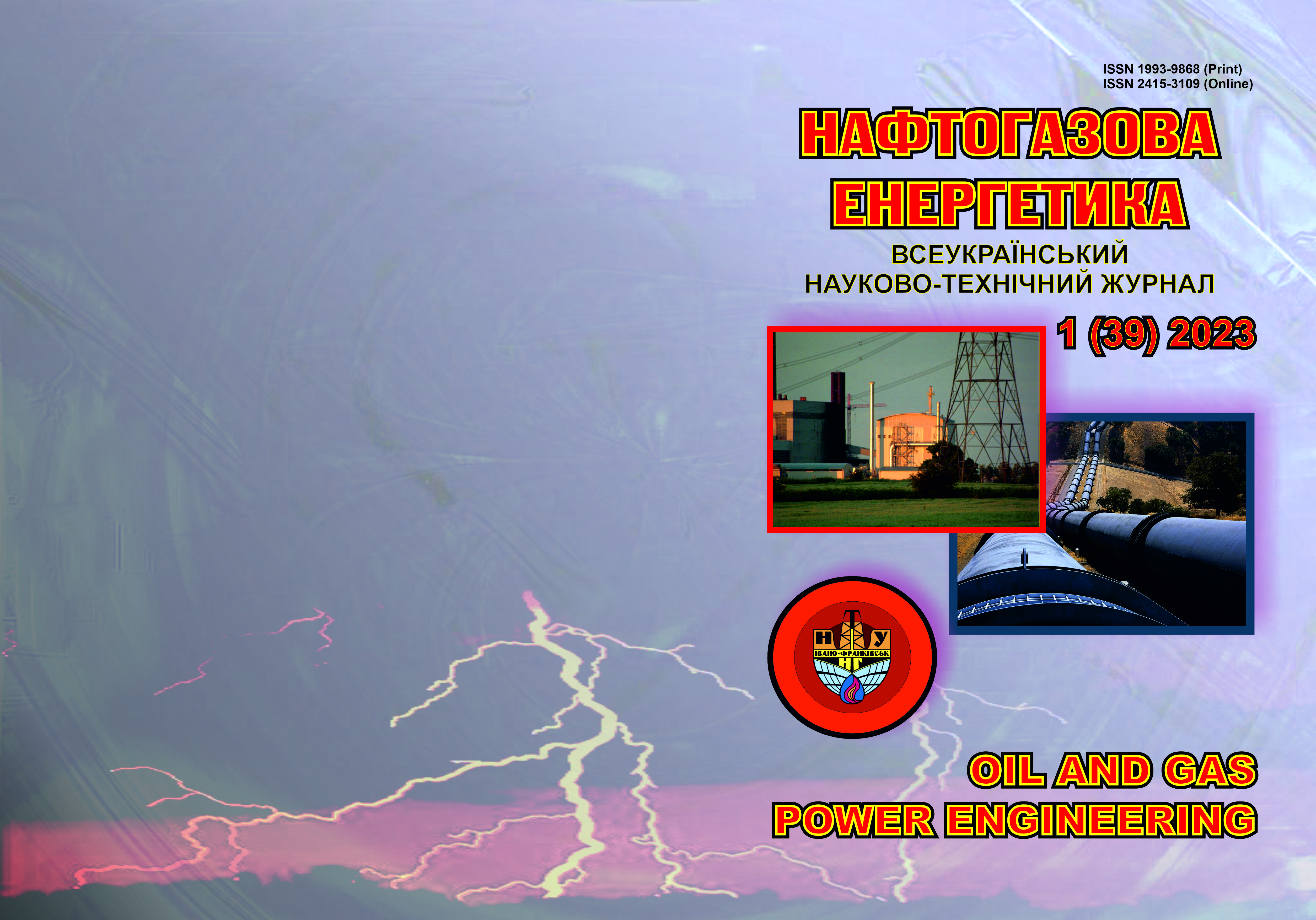ANALYSIS OF METHODS FOR DETERMINING GAS LOSSES DURING BLOWDOWN OF GATHERING PIPELINES AND WELLS TO REMOVE LIQUID ACCUMULATIONS
DOI:
https://doi.org/10.31471/1993-9868-2023-1(39)-24-34Keywords:
gas field; flow; liquid; critical speed; flare pipeline; flow rate.Abstract
The process of blowdown the internal cavity of gathering pipelines and wells of gas and gas condensate fields from accumulated liquid was considered as one of the methods of stabilizing their operation mode, which does not require additional capital investments. The "well - gas collection pipeline" system blowdown through the flare pipeline to the blowdown pit in order to remove the accumulated liquid, which creates excess pressure losses and negatively affects the production potential of the fields, is accompanied by irreversible gas losses, on the vol-umes of which, moreover, according to the legislation of Ukraine, rent payments are distributed. At the same time, the gas that is consumed during blowdown into the atmosphere belongs to the category of greenhouse gases and has a negative impact on the environment. To assess the reliability of the results obtained by the analytical meth-od, the research analyzed the methods of gas enterprises for determining gas losses during blowdowns gathering pipelines and wells of gas and gas condensate fields into the atmosphere. In the study have been determined and analyzed the major parameters of the main equations on which the calculation formulas of the considered methods are based. The results of calculations for the determination of gas losses during blowdowns according to existing methods were considered and compared with actual measurements by a gas meter. It was established that there are significant discrepancies in the results. Thus, the error for methods based on the parameter of the critical flow rate is from 250,6 % to 1065,2 %, for methods that depend on the working flow rate and the correction factor for the flow rate, it is from -48,5 % to 99,3 %. The reasons for the significant calculation error by the considered methods are determined. It was described and defined in the PipeSim software the operating parameters of the gathering pipelines and wells, which result in the formation of a gas flow with a significant liquid content during their blowdowns.
Downloads
References
Volovetskyi V., Uhrynovskyi A., Doro-shenko Ya., Shchyrba O., Stakhmych Yu. Deve-loping a set of measures to provide maximum hydraulic efficiency of gas gathering pipelines. Journal of Achievements in Materials and Manufacturing Engineering. 2020. Vol. 101. Iss. 1.
P. 27-41. http://doi.org/10.5604/01.3001.0014.4088
Doroshenko Ya., Rybitskyi I. Investiga-tion of the influence of the gas pipeline tee ge-ometry on hydraulic energy loss of gas pipeline systems. Eastern-European Journal of Enter-prise Technologies. 2020. Vol. 1. No 8 (103). P. 28-34. http://doi.org/10.15587/1729-4061.2020.192828
Volovetskyi V. B., Shchyrba O. M., Vytiaz O. Yu., Doroshenko Ya. V. Zbilshennia obsiahiv vidboru hazu v umovakh periodychnoi ekspluatatsii z hazokondensatnykh sverdlovyn. Naukovyi visnyk IFNTUOG. 2013. No 2 (35). P. 111-121. [in Ukrainian]
Volovetskyi V. B., Shchyrba O. M., Vytiaz O. Yu., Doroshenko Ya. V. Analiz prychyn zny-zhennia hidravlichnoi efektyvnosti mizhpromyslo-vykh hazoprovodiv ta vybir sposobiv ii pidvyshchennia. Rozvidka ta rozrobka naftovykh i hazovykh rodovyshch. 2013. No 3 (48). P. 147-156. [in Ukrainian]
Doroshenko Ya. V., Karpash O. M., Hozhaiev B. N. Doslidzhennia skladu truboprovidnykh hazoridynnykh potokiv ta vplyvu naiavnykh u nykh shkidlyvykh domishok na rezhymy perekachuvannia, enerhovytraty na transportuvannia. Rozvidka ta rozrobka naftovykh i hazovykh rodovyshch. 2019. No 4 (73). P. 35-45. http://doi.org/10.31471/1993-9973-2019-4(73)-35-45. [ in Ukrainian]
Metodyka vyznachennia pytomykh pokaznykiv vykydiv zabrudniuiuchykh rechovyn v atmosferne povitria dlia osnovnykh vyrobnytstv ta tekhnolohichnykh protsesiv DK «Ukrhazvydobuvannia», 2000. 20 p. [in Ukrainian]
COU 35.2-30019775-054:2012. Normu-vannia vyrobnycho-tekhnolohichnykh vytrat i normatyvnykh vtrat pryrodnoho hazu, tepla ta elektroenerhii. Metodychni polozhennia. [Chynnyi vid 2012-12-11]. Kharkiv, 2012. 12 p. [in Ukra-inian]
Vytiaz О.Yu., Volovetskyi V.B. Vtraty hazu pry produvtsi vykydnykh linij hazovykh sverdlovyn. Naukovyi visnyk IFNTUOG. 2005. No 1(10). P. 69-71. [in Ukrainian]
SOU 60.3-30019801-100:2012. Haz pryrodnyi horiuchyi. Vyznachennia obsiahiv vytrat pryrodnoho hazu na vyrobnycho-tekhnolohichni potreby pid chas yoho transportuvannia hazotransportnoiu systemoiu ta ekspluatatsii pidzemnykh skhovyshch hazu DK “Ukrtranshaz”. [Chynnyi vid 2012-04-02]. Kyiv, 2012. 9 p. [in Ukrainian]
Boiko V.S., Kondrat R. M., Yaremiichuk R. S. Dovidnyk z naftohazovoi spravy / za zah. red. dokt. tekhn. nauk V. S. Boika,R. M. Kondrata, R. S. Yaremiichuka. Lviv: Ottsiv Vasyliian "Misioner", 1996. 620 p. [in Ukrainian]
Metodyka. Vyznachennia vyrobnycho-tekhnolohichnykh vtrat pryrodnoho hazu na yoho vydobuvannia, transportuvannia mahistralnymy hazoprovodamy ta ekspluatuvannia pidzemnykh skhovyshch hazu. Chastyna II. Tekhnolohichnyi haz. [Chynnyi vid 2011-03-02]. Kyiv, 2011. 7 p. [in Ukrainian]
Konstantinov Yu. M., Hizha O. O. Tekhnichna mekhanika ridyny i hazu: pidruchnyk. Kyiv: Vyshcha shkola, 2002. 277 p. [in Ukrainian]
Truboprovidnyi transport hazu / M.P.Kovalko ta in. Kyiv: Arena EKO, 2002. 600 p. [in Ukrainian]
Hrudz V. Ya., Hrudz Ya. V., Drin N. Ya., Demianchuk Ya. M. Influence of soil filtration resistance on intensity of pipeline emergency leaks. Prospecting and development of oil and gas fields. 2015. No 2 (55). P. 68-73. [in Ukrainian]
Makarenko R. O., Koval O. D., Khlystun O. I. Hidrohazomekhanika: navch. posib. Kyiv: NAU, 2016. 220 p. [in Ukrainian]
Susak O. M., Kasperovych V. K., Andriishyn M. P. Truboprovidnyi transport hazu: pidruchnyk. Ivano-Frankivsk: IFNTUNH, 2013. 345 p. [in Ukrainian]
Transportuvannia nafty, naftoproduktiv i hazu : navch. posib. / L. N. Shyrin ta in. Dnipro: NTU "DP", 2019. 203 p. [in Ukrainian]
Downloads
Published
How to Cite
Issue
Section
License
Copyright (c) 2023 Oil and Gas Power Engineering

This work is licensed under a Creative Commons Attribution-ShareAlike 4.0 International License.


.png)






1.png)









